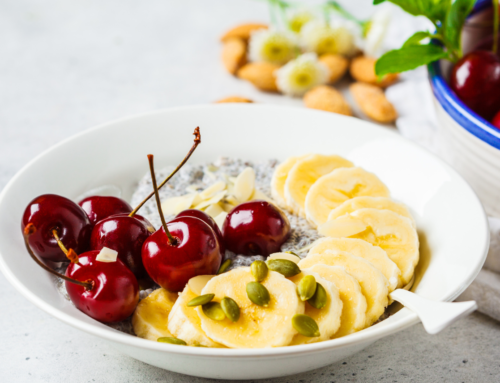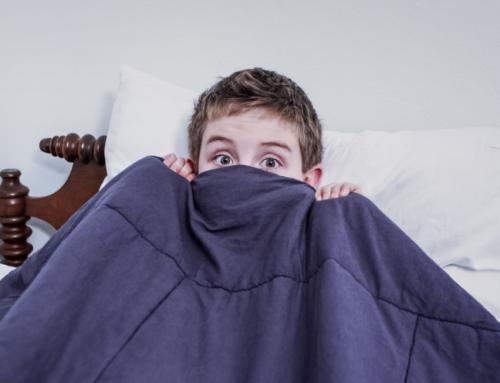What we eat not only affects our overall health and waistline, but also our sleep. There are many foods we can consume for a good sleep. Research does not point to one diet that results in better sleep. Rather studies suggest that largely unprocessed wholefood consumption is best for improving sleep quality and duration in both adults and children. (1) In addition, how much we consume can affect our sleep. Difficulty maintaining sleep has been found when consuming fewer foods, and is also associated with daytime sleepiness. (2)
The effect of macronutrient intake on sleep.
In this post we take a look at proteins, carbohydrates and fats which are elements of a balanced diet. An imbalance in these essential nutrients has been linked to sleep disturbances. For example, in sleep-deprived children (between the ages of 9-12) a study showed their macronutrient intake was imbalanced, with high junk food consumption, compared to children with no sleep deprivation who consumed 60% carbohydrates, 20% proteins and 20% lipids. (3) Therefore, when there are sleep disturbances it is important to look at the intake and quality of proteins, carbohydrates and fats ingested.
Healthy fats for a better sleep.
The amount of healthy fats we need to consume varies across the lifespan. When infants begin eating solids they require more healthy fats (50%) in their diet, which decreases to about 30% when they are three. (4) If you are unsure about what constitutes a healthy versus unhealthy fat, a good rule of thumb is to look to natural forms and avoid processed foods, fried foods, low-fat foods and vegetable/seed oils. In general, high saturated fat intake has been linked to difficulty falling asleep and maintaining sleep. (2)
Foods to include healthy fat in your diet or your child’s diet:
Avocado – try spreading on toast, crackers or making guacamole
Cheese
Eggs – try hard boiled, egg muffins or frittata
Greek yoghurt – top with nuts and seeds
Nuts
Olive oil – for example drizzled on vegetables
Salmon
Tinned tuna
Protein improves the quality of sleep.
Protein is important for energy levels and sleep quality. It provides amino acids like tryptophan which is needed to make melatonin, our sleep hormone. It is no wonder then that low protein intake has been associated with poor sleep. (1) How much protein do we need? It seems protein intake should vary across the lifespan. After an extensive literature review, a group of researchers suggested the optimal protein intake for infants up to 12 months as no more than 15%. (5) In another study of children between the ages of 9-12 those who had better quality sleep consumed 20% proteins. (3) If you are worried about how much protein intake your child needs check out this great article from my Nutritionist friend Krissy. Adults too should consume sufficient protein for a good sleep. A study found that adults who consumed 20% of protein, from animal or vegetable sources, had the best improvements in the Global Sleep Score whereas other percentages of protein intake showed no significant improvements. (6)
Foods to include protein in the diet:
Dairy – milk, Greek yoghurt and cheese
Eggs
Fish and seafood
Lean meats and poultry
Legumes and beans
Nuts and seeds
Carbohydrates aid sleep.
Complex carbohydrates such as a diet rich in fiber have the best effects on sleep while a sugar-laden diet negatively affects sleep. A diet rich in fiber has been shown to be associated with deeper, more restorative sleep whereas a low fiber intake leads to lighter, less deep sleep. (7) In addition, sugar consumption too close to bedtime can result in more frequent arousals. For example, in one study children were either given a low glycaemic-index drink (cow’s milk with 1 TBS of honey) or a high glycaemic-index drink (cow’s milk with 1 TBS of glucose) an hour before bedtime. Those who consumed the high glucose drink one hour before bedtime woke up more frequently, particularly in the first part of the night, and had poor sleep quality. (8)
Foods to include carbohydrates in the diet:
Fruit
Legumes – chickpeas, kidney beans
Sourdough bread
Vegetables – try raw vegetable sticks, roasted potato or sweet potato chips
Wholegrains such as oats, buckwheat, barley, quinoa, oats
Wholemeal spelt flour to cook goodies such as muffins and biscuits
The takeaway message from this blog post is that nutrition affects our sleep and should not be overlooked if you or your little one is having sleep challenges. I don’t recommend people calculate the amount of macronutrients consumed. Instead, if there are sleep challenges I recommend
- removing as many processed foods and high sugar foods from the diet as possible
- incorporating more wholefoods from the five food groups as this will help you to obtain sufficient quality macronutrients. Nutrition Australia states the five food groups as being:
- vegetables and legumes
- fruit
- grain, cereals
- lean meats, poultry, fish, eggs, nuts, seeds, legumes, beans
- milk, yoghurt, cheese and/or their alternatives
- ensure you are eating sufficient calories throughout the day and not right before bedtime
- avoid high sugar foods too close to bedtime
- watch caffeine and alcohol consumption, which can interfere with sleep too.
With tweaks to the diet you may well be on your way to better sleep.
For educational purposes only. If you suspect you have a medical problem, please see a physician.
All the links in this blog are completely unsponsored and contain no affiliate payments. I just like to mention quality resources and/or other health professionals I know and recommend.
References.
- Campanini, Marcela Z, Guallar-Castillón, Pilar, Rodríguez-Artalejo, Fernando, & Lopez-Garcia, Esther. (2017). Mediterranean Diet and Changes in Sleep Duration and Indicators of Sleep Quality in Older Adults. Sleep, 40(3). https://doi.org/10.1093/sleep/zsw083
- Grandner, Michael A, Jackson, Nicholas, Gerstner, Jason R, & Knutson, Kristen L. (2014). Sleep symptoms associated with intake of specific dietary nutrients. Journal of Sleep Research, 23(1), 22–34. https://doi.org/10.1111/jsr.12084
- Yehuda, S., Rabinovitz-Shenkar, S. & Carasso, R. (2011). Effects of essential fatty acids in iron deficient and sleep-disturbed attention deficit hyperactivity disorder (ADHD) children. Eur J Clin Nutr, 65, 1167–1169. https://doi-org.ezproxy.une.edu.au/10.1038/ejcn.2011.80
- Patel JK, Rouster AS. (2020). Infant Nutrition Requirements and Options. Treasure Island, Florida: StatPearls Publishing. https://www.ncbi.nlm.nih.gov/books/NBK560758/
- Hörnell, A., Lagström, H., Lande, B., & Thorsdottir, I. (2013). Protein intake from 0 to 18 years of age and its relation to health: a systematic literature review for the 5th Nordic Nutrition Recommendations. Food & Nutrition Research, 57. https://doi.org/10.3402/fnr.v57i0.21083
- Jing Zhou, Jung Eun Kim, Cheryl LH Armstrong, Ningning Chen, Wayne W Campbell. (2016). Higher-protein diets improve indexes of sleep in energy-restricted overweight and obese adults: results from 2 randomized controlled trials. The American Journal of Clinical Nutrition, 103(3), 766–774. https://doi.org/10.3945/ajcn.115.124669
- St-Onge MP, Roberts A, Shechter A, Choudhury AR. (2016). Fiber and saturated fat are associated with sleep arousals and slow wave sleep. J Clin Sleep Med. 12(1):19-24. doi: 10.5664/jcsm.5384
- Jalilolghadr S, Afaghi A, O’Connor H, Chow CM. (2011). Effect of low and high glycaemic index drink on sleep pattern in children. J Pak Med Assoc. 61(6):533-6.






[…] Related Post: The influence of food on sleep […]